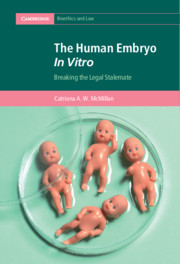Book contents
Introduction
Published online by Cambridge University Press: 18 March 2021
Summary
In this introduction, McMillan introduces key concepts and definition discussed throughout the book, including: liminality, ‘the embryo’, process, and ‘legal status’. The regulation of emerging technologies may be described as the governance of processes in persistent flux, and in some cases, it is the regulation of what we do not yet know or fully understand. Reconciling process with progress, therefore, has not been easy. Nonetheless, the regulation of the embryo in vitro, and all the practices that law currently allows are, in essence, regulating for processes of change. Considering that it has been over 30 years since the 1990 Act was passed in its original form, is it time to legally reconceive ‘the embryo’? In this book McMillan calls for, and considers, the basis for a more coherent and robust intellectual defence of the ways in which we justify the different manners in which law treats different types of embryos created purposively towards different ends. The main questions that this analysis seeks to answer are the following: Overall, does law reflect and embody processual regulation, if so, what does this look like? And if not, what form could it take if reform were thought to be desirable?
Keywords
- Type
- Chapter
- Information
- The Human Embryo In VitroBreaking the Legal Stalemate, pp. 1 - 14Publisher: Cambridge University PressPrint publication year: 2021

